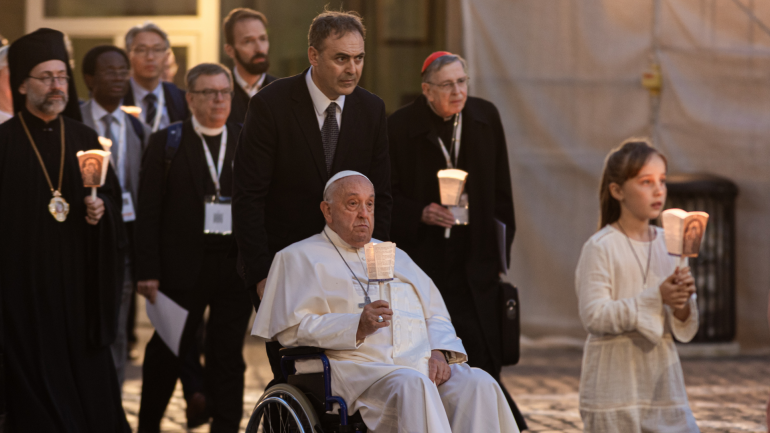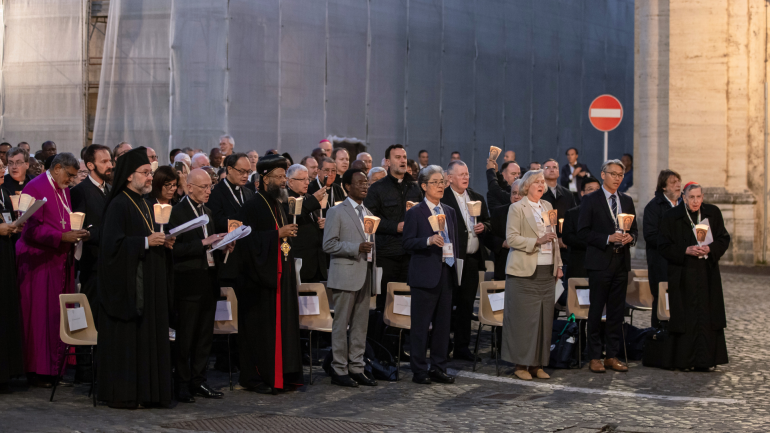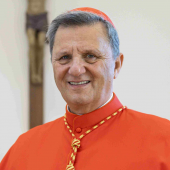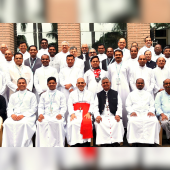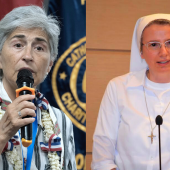'Journey Toward Harmony, Not Uniformity,' says Pope Francis
During a profoundly symbolic ecumenical vigil commemorating the anniversary of the Second Vatican Council, Pope Francis emphasized that Christian unity is a journey toward harmony, not uniformity, and called for an urgent effort to overcome divisions that weaken the Church’s common witness.
The event on 11 October, attended by Christian leaders from various denominations and believers from around the world, took place in Protomartyrs Square, steeped in historical and theological significance.
As the Church continues its synodal journey, Pope Francis urged Christians to work together in addressing the divisions that threaten their shared mission.
Pope Francis stressed that Christian unity should not be understood as uniformity but as harmony. The distinction he drew was essential: while uniformity implies a forced sameness, harmony celebrates diversity within the framework of unity.
Reflecting on the lessons learned from the ongoing synodal process, the Pope stated, "Unity is harmony among the diversity of charisms, brought to life by the Holy Spirit for the benefit of all Christians." His insight recalls the words of St. Basil, who described the Holy Spirit as "harmony itself."
The Holy Father clarified that the diversity within the Church, far from being a sign of weakness or division, is a testament to the creativity of the Holy Spirit.
"Let us trust the Holy Spirit, who draws us to unity in the harmony of a multi-faceted diversity," the Pope urged.
This journey toward harmony, he explained, is a process of discovery, one in which Christians do not know the full outcome in advance but trust that the Holy Spirit will lead the way.
This perspective on unity resonates with the teachings of Vatican II, particularly the Decree on Ecumenism (Unitatis Redintegratio), which emphasized that the closer Christians come to Christ, the closer they come to one another. By moving toward Christ, Christians naturally move toward each other, in a process shaped by the Spirit rather than human effort.
In his homily, Pope Francis reiterated the essential link between unity and mission. Quoting the Gospel of John, he said, “That they may all be one... so that the world may believe” (Jn 17:21).
Christian disunity, he noted, "scandalizes the world" and hampers the Church’s mission to preach the Gospel. This conviction, held by the Council Fathers of Vatican II, remains relevant today.
The Pope’s words reflect an urgent call to overcome divisions that hinder the common witness of Christians and weaken the Church's missionary zeal.
One of the most powerful themes in Pope Francis' message was the "ecumenism of blood," referring to the unity found in the shared martyrdom of Christians from different traditions.
The Roman protomartyrs and modern-day martyrs, who die for their faith regardless of denominational affiliations, offer a profound witness to Christian unity.
“Their witness speaks more powerfully than any words,” Pope Francis said, reminding those present that Christian unity is born from the Cross of Christ. This shared suffering is a testament to the enduring call for unity, even in the face of persecution and death.
Pope Francis linked the concept of synodality directly to Christian unity, describing synodality as the path that God expects the Church to take in the third millennium.
He emphasized that the journey of synodality is and must be ecumenical, meaning it is a path that should be traveled by all Christians together.
This insight underscores that unity is not a mere organizational goal but is intrinsically tied to the Church’s deeper understanding of itself as the Body of Christ.
"The Synod is not about creating something new but about welcoming the gift of unity already given to us by the Holy Spirit," Pope Francis explained.
The Synod, in this context, is a process of discernment, where the Church seeks to understand and accept the unity that the Holy Spirit desires to manifest among believers.
Pope Francis’ emphasis on synodality as a journey rather than a destination highlights the openness and flexibility required for ecumenical dialogue. The Pope openly admitted that “we do not know beforehand what the outcome of the Synod will be,” signaling a humility and dependence on the guidance of the Holy Spirit.
Pope Francis’ message at the ecumenical vigil in Protomartyrs Square highlighted two critical aspects of Christian unity: first, that unity is not about achieving uniformity but rather harmony in diversity; and second, that overcoming division is essential for the Church’s mission in the world.
As the Church embarks on its synodal journey, Pope Francis’ words serve as a reminder that unity is both a gift and a task.
It is a gift given by the Holy Spirit, and a task that requires openness, dialogue, and mutual respect among Christians of all traditions.
Ultimately, the journey toward Christian unity is a journey toward deeper communion with Christ, and through him, with one another.-With input from the Vatican News
Radio Veritas Asia (RVA), a media platform of the Catholic Church, aims to share Christ. RVA started in 1969 as a continental Catholic radio station to serve Asian countries in their respective local language, thus earning the tag “the Voice of Asian Christianity.” Responding to the emerging context, RVA embraced media platforms to connect with the global Asian audience via its 21 language websites and various social media platforms.





